Ravens have long been seen as symbols of intelligence, transformation, and mystery, appearing in folklore, mythology, and cultural traditions across the world. Often regarded as messengers between worlds, they are associated with prophecy, trickery, creation, and even death. Some cultures fear them as omens of misfortune, while others revere them as bearers of wisdom and powerful supernatural beings.
In this article, we will first explore some of the most fascinating raven stories from different traditions, highlighting their symbolic importance in mythology. Then, we will delve deeper into their religious and spiritual meanings, examining how different cultures have interpreted these remarkable birds throughout history.
Stories of the raven
The Birth of the Raven
This story tells how the Raven came to birth. It is a Tahltan tribe story, from an Indigenous group living in British Columbia, Canada.
A number of people were living together near the sea. Among them was a man gifted with magic power, who did not live with his wife. He watched her closely and forbade any other man from going near her. He had a married sister, who gave birth to a boy that grew rapidly. When the boy was old enough to travel, his uncle asked his mother for permission to take him hunting in a canoe. She consented. When they had gone some distance from the shore, the man rocked the boat violently until the boy fell into the water and drowned. The man returned home and told his sister that the boy had fallen overboard and was lost. His sister gave birth to another son. When the child had grown a little, the uncle again asked to take him hunting, and once more, he drowned the boy in the same manner. This continued with every son his sister bore.
At last, she gave birth to another son – this was Raven. Unlike the others, Raven was different from birth. He played in a way unlike other children, showing an unusual cleverness. He carved wooden toys, shaping canoes, people, and animals, and played with them. One day, his uncle once again asked his mother for permission to take him out in the canoe. She refused several times, saying, “He is my last child, and I do not want to lose him.” But the boy assured her: “Let me go! I shall not meet with any harm.” Reluctantly, she consented.
Before leaving, Raven hid a small toy canoe under his blanket. When his uncle rocked the canoe to drown him, he fell into the water, but instead of sinking, he remained below the surface for some time. Then, he took out his toy canoe, and using his magic, he made it grow into a full-sized boat. He climbed inside and paddled safely home.
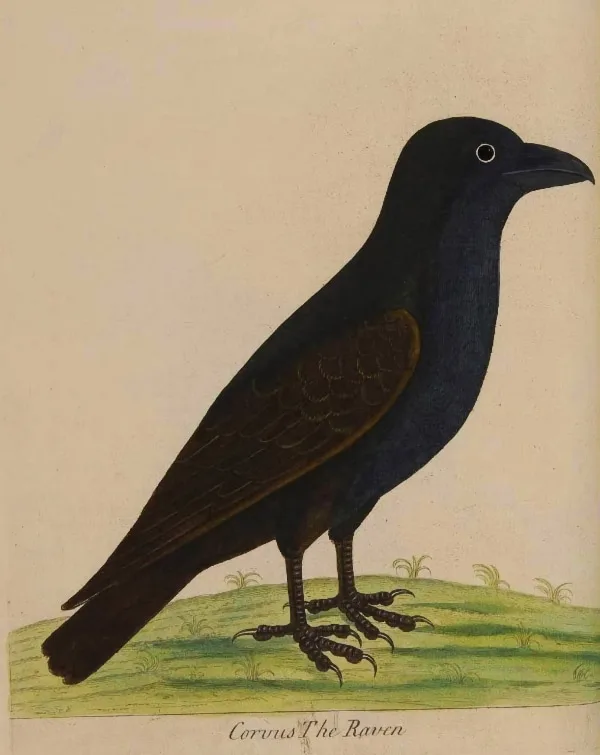
Meanwhile, his uncle had already returned and told his sister: “Your son drowned, just like the others. He was foolish.” But soon after, the boy arrived home alive and told his mother the truth: “Uncle killed my brothers, just as he tried to kill me.” His mother was relieved and overjoyed, for she had already believed him dead. Some time later, the uncle again asked to take the boy out to sea, and the mother, despite her fears, let him go. Once more, the uncle tried to drown him, but Raven escaped the same way. The third time the uncle asked, Raven refused, saying: “You always try to kill me.” Enraged, the uncle went out to sea alone.
Meanwhile, Raven ran to his uncle’s house and found his wife. He saw that she always kept her arms pressed down at her sides. Curious, he tickled her to make her raise her arms. Suddenly, a blue jay flew out from one armpit and a woodpecker from the other. The woman died immediately. Her husband, sensing something was wrong, rushed home. When he found his wife dead and the birds gone, he became furious. He chased the boy, intending to kill him. But Raven placed his small canoe on the water. It grew instantly, and he escaped into the sea. From that day forward, he became Raven, the trickster and wanderer, traveling the world and never returning to the place of his birth.
How Raven Made Pelican Steal Fire for a Good Cause
Only the Rock People had fire, and they guarded it jealously, allowing no one else to use it. Raven, seeing that all others suffered without fire, decided that everyone should have access to its warmth and power. He went to the Rock People and demanded fire, but knowing he was a trickster and deceiver, they drove him away. To keep him from trying to steal it, they surrounded their village with a wide stretch of water, making it impossible for Raven to enter unseen.
Raven knew he could not steal the fire himself, so he turned to the birds for help. He spoke to all the water birds, but none would listen to him. They refused to challenge the Rock People, fearing their wrath. Determined, Raven set a snare and caught Tu’tcasada’, the pelican, a bird with a long beak. He threatened him, saying: “I will split your face, kill you, and leave your body to grow cold unless you promise to steal the fire for me!” Tu’tcasada’, like many other birds, was considered harmless by the Rock People, and he was allowed into their house to warm himself by the fire in cold weather. Still wary, Raven asked him: “Can you truly steal fire if you wish?” The pelican replied, “Yes, I can.” Raven pretended to doubt him and continued questioning him, testing his patience. At last, Tu’tcasada’ became angry and declared: “I will show you that I can take the fire!”
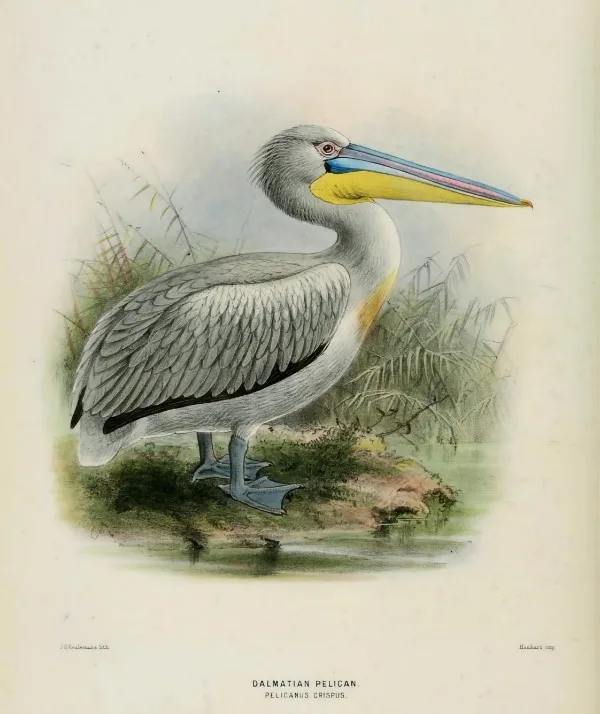
The pelican flew across the water and entered the Rock People’s house as usual. As they sat around the fire, not suspecting him, he waited for the right moment. When no one was looking, he snatched a piece of fire in his beak and ran out of the house. The Rock People realized what had happened and chased after him, but they could not cross the water fast enough. Tu’tcasada’ flew swiftly, his beak burning as he carried the fire, and delivered it to Raven. Upon receiving it, Raven threw the fire into the forests, declaring: “Henceforth, fire shall be in trees and wood, and all people shall have the chance to use it!”
And so, from that moment, fire could be made from wood by rubbing sticks together, and it could also be made from striking rocks, because fire itself was originally rock. However, Tu’tcasada’ did not escape unscathed. As he carried the fire in his beak, it burned him, and when he finally dropped it, his once-long beak became shorter and scorched. This is why, to this day, the pelican’s beak is not as long as it once was.
How Raven Colored the Birds
Raven called for a great feast and invited all the birds. As they gathered, he decided to paint each one in a unique way, giving them their distinct colors and markings. He painted Robin red on the breast, gave Bluejay a blue coat and a knot on his head, and tied up Ruffed Grouse’s feathers, which is why grouse have crests today. He painted Bald Eagle’s head, neck, and back white, leaving the rest of his body black.
Once he had finished his work, he turned to the birds and declared: “I will now cut up the bear and prepare a feast for you. Now, let us eat!” But at the last moment, Raven changed his mind. Instead of serving the meal, he grew angry for no reason and decided he wanted to fight the birds instead. Seeing his sudden rage, the birds became frightened and fled, but they kept the colors he had given them. Those whose feathers he had tied up now have crests, and the birds remain as he painted them to this day.
Later, Raven decided to go to war against Grizzly Bear. He called all the young warriors, including all the birds and smaller animals, and prepared them for battle. He painted some black, others with white, blue, and yellow stripes and spots. He painted the head of the Mallard Duck green, and the head of the loon as we see it today. He armed some of the birds with spears, which is why certain birds now have long, sharp beaks. Loon was chosen as the war-chief, and Raven gave him a big spear, which is why loons have large beaks today.
When all was ready, Raven cooked a great feast, but instead of sharing it, he ate it all himself. The birds, realizing they had been tricked, became furious. Robin was the first to protest, and soon all the birds joined in, growling at Raven. In a rage, Raven grabbed a stick and threatened them, forcing them to flee. Some birds hid in the lakes, some took refuge in the woods, others fled to the mountains and rivers.
“It is not good for all birds to live in the same place,” Raven declared. “It will be better for people if the birds are scattered. From now on, each bird shall have its own home!” And so, birds spread across the land – some to the mountains, others to the forests, marshes, rivers, and lakes. This is why birds are scattered across different environments today, and why each species has its own colors and markings, as Raven painted them long ago.
How Raven Found and Lost His Pretty Wife Goose
For a long time, Raven lived alone, but eventually, he grew tired of solitude and decided to take a wife. He looked around and saw that it was late autumn, with large flocks of birds flying southward to warmer lands. Thinking this was the perfect opportunity, Raven flew ahead and landed directly in the path of the migrating birds. As he sat waiting, a young and beautiful Canadian Goose approached. Modestly, he looked down at his feet, avoiding eye contact, and then called out: “Who wishes me for a husband? I am a very nice man.” But none of the geese turned to look at him. Soon, a family of White-fronted Geese came along, consisting of the parents, four brothers, and a sister. Raven tried again, this time speaking louder: “Who wishes me for a husband? I am a fine hunter and am young and handsome.” The geese landed just beyond him, and Raven thought to himself: “Now I will get a wife.”
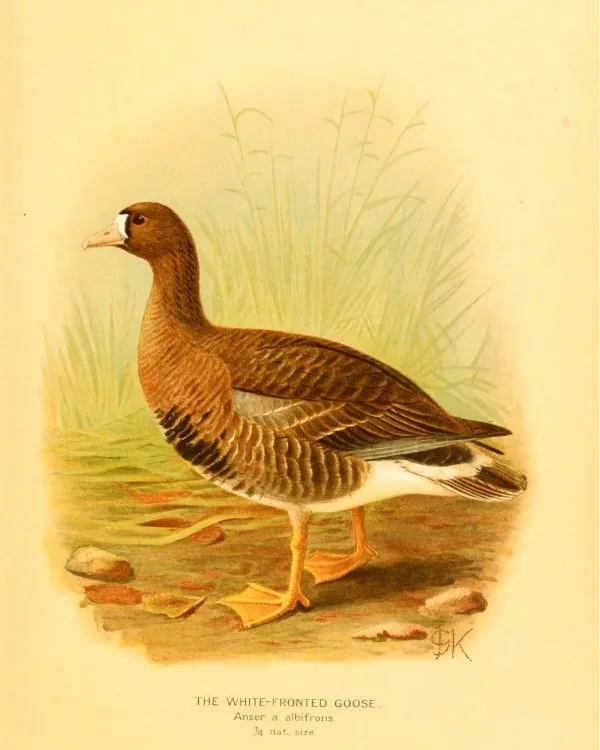
Looking around, he noticed a pretty white stone with a hole in it lying nearby. He picked it up and strung it on a long grass stem, then hung it around his neck. Then, using his trickster magic, he pushed up his beak, causing it to slide to the top of his head like a mask. Instantly, he transformed into a dark-colored young man and walked up to the geese. At the same moment, each of the geese pushed up its own beak, transforming into handsome men and beautiful women. Raven was greatly pleased with the young goose maiden, and presented her with the white stone, choosing her as his wife. She hung it around her own neck as a symbol of their union.
Then, the geese pushed their beaks back down, transforming back into birds, and took to the skies, flying southward. The geese flapped their wings heavily, working hard to push through the wind, but Raven glided effortlessly, soaring ahead without effort. As they watched him, the geese marveled at his grace and said: “How light and swift he is! What an excellent flyer!” Raven, pleased with their admiration, pretended to be strong but soon grew tired. After a while, he suggested: “We had better stop early and find a place to sleep.” The geese agreed and they landed for the night. The next morning, the geese were eager to leave, but Raven slept heavily and had to be shaken awake. The father goose warned: “We must make haste! The snow will come soon – we cannot linger.” Raven, though still drowsy, pretended to be eager and led them forward with outstretched wings, again receiving admiration from the flock.
The next morning, the geese departed before breakfast, while Raven’s stomach growled with hunger. He longed for the sweet berries that grew in abundance, but the geese would not stop to eat, so he dared not complain. The father goose announced: “We will stop once to rest, but after that, the next stretch will bring us to the other shore.” Raven grew nervous. He was not sure he could make it across the great water, but he was too ashamed to admit his weakness. So, he took off with the others, determined to keep up.
The geese flew tirelessly, their wings beating steadily as they moved across the sky. Raven, however, struggled. His wings ached, and despite trying to glide, he fell farther and farther behind. The father goose noticed and said: “I thought he was strong and swift, but he must be getting tired. Let us wait.” Gasping for air, Raven lied: “I have an old arrowhead lodged in my chest from a great battle long ago! It pains me greatly – that is why I have fallen behind.” The geese pitied him, and they rested for a while.
However, when they took off again, Raven fell behind once more. This time, he repeated his story, saying: “The arrow has pierced my heart! Wife, put your hand on my chest and feel how it moves inside me.” His wife did as he asked, but felt nothing except his heart beating like a hammerstone. She said nothing but knew he was lying. The geese resumed their flight, but now, Raven was truly exhausted. His wings grew heavy, and as he neared the great waters, he began to sink lower and lower.
As Raven drifted toward the sea, he cried out to his wife: “Give me the white stone! Throw it back to me! I need it!” For the stone contained magic, and without it, he was powerless. But the young goose did not return it. Raven screamed and pleaded, but his wings lost their strength, and he fell helplessly into the water. The geese continued forward, reaching the distant shore, while Raven drifted, struggling against the waves. He tried to lift himself, but his waterlogged wings weighed him down, and he floated helplessly along the beach.
After a long time, a great wave came and threw him onto the land. As the water flowed back, Raven dug his claws into the pebbles, clinging desperately so he would not be dragged back into the sea. At last, Raven crawled up the shore, a pitiful sight. Water poured from his soaked feathers, and his wings dragged uselessly behind him. He stumbled several times, falling to the ground, before finally reaching some bushes. There, he pushed up his beak, once again becoming a small, dark-colored man. He looked all around, but the geese were gone. Sighing deeply, Raven realized he had lost his wife – not because of misfortune, but because of his own lies and weakness.
The Few Men That Understand the Cries of the Raven
Among the Kwakiutl people, it is believed that only a few men are gifted with the ability to understand the cries of the raven. This rare knowledge is passed on through a sacred ritual at birth. When a child is born, if the afterbirth is placed on the beach and ravens come to peck at it, that child, once grown, will understand the cries of the raven.
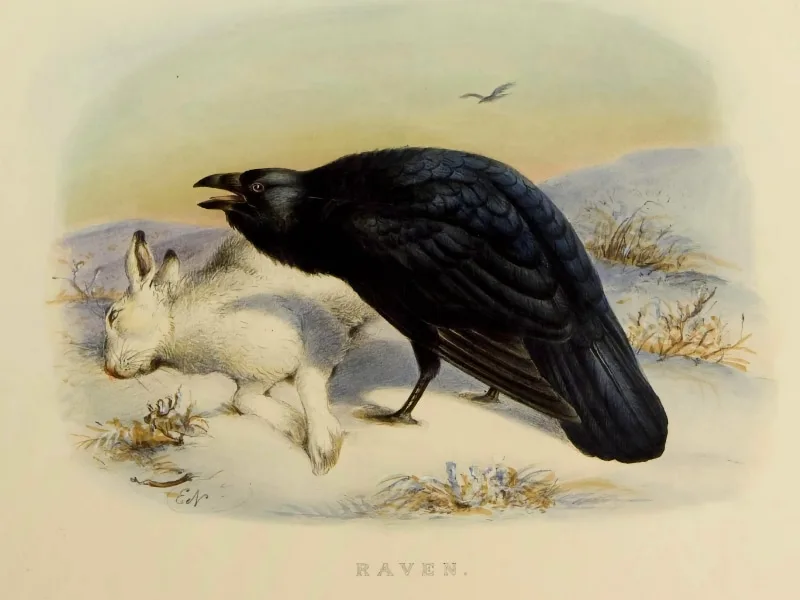
The people of olden times believed that ravens acted as messengers, bringing news of important events, especially the arrival of warriors preparing for battle. Whenever the ravens tumbled about and cried loudly, the people would seek out one of the rare men who could interpret their warnings. If ravens fought in the air and their feathers fell, it was a sign of terrible news. During feasts and gatherings, the elders of the Kwakiutl people recited the different raven cries, explaining their meanings.
Below are the various calls of the raven, as understood by those gifted with their knowledge:
- Ga ga ga gai – Warriors are coming to make an attack.
- Gax gax gax – Ravens will eat the bodies of people drowned by the capsizing of canoes.
- Qudzo qudzo – Hunters will bring much meat to feed the people.
- Gaga ha hagae – A chief (or another important person) has died.
- Xagaq xagaq – A woman is going to die.
- SOX SOX sox – It will be calm and sunny.
- Gus gux gus – There will be heavy rains.
- Wax wax wax – A stranger will arrive on a visit.
- Xwo xwo xwo – There will be a poor salmon run.
- Xok xok – When ravens cry like this while fighting in the air, there will be bad news.
Only those whose afterbirths had been eaten by ravens could truly understand their messages. Among the people, there were very few such individuals, and they were highly respected for their ability to interpret the will of the ravens.
A Murderer Detected Through Ravens
A gentleman, who had once been robbed by his servant, chose to forgive the man instead of punishing him – on the condition that he would abandon his bad ways. The servant kept his promise, working honestly for many years. Over time, he earned enough money to get married and even opened an inn along a well-traveled road.
About twenty years later, the gentleman happened to travel through the area and stopped at the inn, unaware that it belonged to his former servant. The innkeeper, however, recognized him immediately and came forward, expressing how grateful and honored he was to serve his old master again. “What a joy it is to see you again! Please allow me to take care of you.” The man offered his guest the finest room and the best food, appearing to show sincere hospitality. But when night fell, his true intentions were revealed. The treacherous innkeeper, despite all his outward affection, could not resist his evil nature. That very night, he stabbed his former master with a dagger, killing him in cold blood. To cover up the crime, he loaded the body onto a cart, drove it to a river behind the inn, and pierced the corpse with a long, sharpened stake, forcing it deep into the muddy riverbed so that the body would not rise to the surface.
For a few days, the crime remained undiscovered. Then, from all directions, ravens suddenly appeared at the very spot where the body had been hidden. Their loud, persistent croaking was unusual for that place, and the locals began to take notice. No matter what the villagers did, the ravens refused to leave. They cawed relentlessly, circling over the riverbank, as if calling for justice. People started to suspect something was wrong. Their curiosity grew, and eventually, they decided to investigate the source of the disturbance. After some effort, they pulled the wooden stake from the riverbed. The moment the stake was removed, the corpse floated to the surface.
With the body now exposed, suspicion quickly turned to the innkeeper. Villagers noticed wheel marks leading from the back of the inn straight to the riverbank, linking him to the crime. The evidence was undeniable. Confronted with the truth, the innkeeper broke down and confessed his guilt. He had thought his crime was hidden forever, but it was the ravens who revealed the murder, their cries serving as the voice of justice.
Deep dive into raven meaning and symbolism
The raven has long been a figure of mystery, power, and transformation across cultures. The stories we have explored show various aspects of the raven’s symbolic nature – ranging from trickster and deceiver to bringer of wisdom, justice, and creation.
Raven as a trickster and shape-shifter
In many Indigenous traditions, raven is a trickster figure, capable of transforming himself and others. In “How Raven Found and Lost His Pretty Wife Goose,” we see raven using deception and disguise to win a wife, only for his own arrogance and dishonesty to cause his downfall. This reflects the idea that deceit and trickery, even when successful in the short term, often lead to ruin.
Similarly, in “How Raven Colored the Birds,” we see raven taking on the role of a chaotic creator, painting birds in beautiful colors but then hoarding food for himself and angering them all. These stories highlight the duality of raven – he is both a giver of gifts and a selfish trickster, showing how intelligence and cunning can be used for both good and selfish ends.
Raven as a culture hero and bringer of knowledge
While raven is often mischievous, he is also a great benefactor to humanity, as seen in “How Raven Made Pelican Steal Fire for a Good Cause.” Here, raven is not a mere troublemaker, he seeks to give fire to the world, an essential element for survival. Though he tricks pelican into helping him, his goal is noble: to share power with all creatures. This echoes many creation myths where raven brings light or fire to the people, a common theme in Native American and Inuit traditions.
In “The Few Men That Understand the Cries of the Raven,” we see raven in a spiritual and prophetic role. His cries are believed to foretell major events, from death and war to changes in the weather. This reinforces the raven’s role as a messenger between worlds, bridging the natural and supernatural. Those chosen to understand him, marked by the fate of their afterbirth, are special figures within their communities, demonstrating how some people are believed to have a deeper connection with nature and its signs.
Raven as a harbinger of justice and omens
One of the strongest symbolic themes in these stories is raven as a bringer of truth and justice. In “A Murderer Detected Through Ravens,” the ravens act as supernatural agents of fate, gathering around the site of a hidden crime and forcing the villagers to uncover the truth. This highlights a widespread belief that ravens are connected to the spirits of the dead and that their unusual behavior can reveal hidden crimes or misdeeds.
Ravens are often seen as watchful and intelligent creatures that cannot be fooled. Their unwavering presence at the site of the crime mirrors their reputation in many cultures as omens of fate, keepers of truth, and avengers of the wronged.
Other raven tales and global symbolism
The raven is a figure of contradiction and complexity, appearing in myths, legends, and spiritual traditions across the world. While some cultures see the raven as a harbinger of death and misfortune, others revere it as a symbol of wisdom, transformation, and prophecy. The stories we have explored show many of these themes, but the raven’s significance extends even further across different civilizations.
In Norse mythology, the god Odin was accompanied by two ravens, Huginn and Muninn, whose names mean “thought” and “memory.” These birds flew across the world each day and returned to whisper secrets and knowledge into Odin’s ears. This reflects the raven’s association with wisdom and foresight, reinforcing its role as a bridge between the mortal and divine realms. Odin himself was known as the Raven God, a figure of both war and mystical knowledge.
Among the Celts, ravens were linked to battle and prophecy, often appearing before great conflicts. The Morrigan, a goddess of war and fate, could take the form of a raven, flying over battlefields and deciding the fates of warriors. Seeing a raven before a battle was often taken as an omen, signaling either doom or victory.
In Native American and Inuit traditions, raven is often portrayed as a trickster, creator, and culture hero. The stories we have covered, such as Raven stealing fire and transforming the world, are part of a larger tradition in which raven is not just a mischievous figure but also a being of immense power, shaping the world and granting humans essential gifts like light, fire, and wisdom. Among the Haida and Tlingit peoples of the Pacific Northwest, raven is the one who brings the sun into the sky, an act of both cunning and generosity.
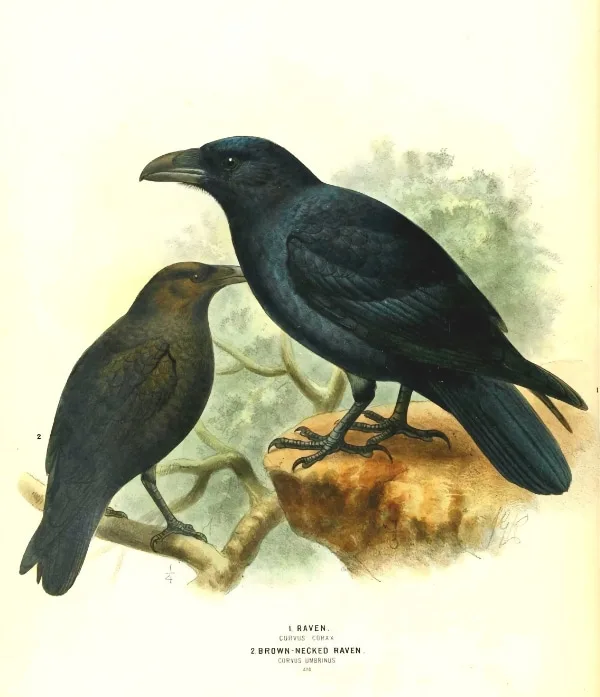
While raven plays a major role in many Indigenous traditions, in Cherokee mythology, his presence is more ominous. The Cherokee believed in the Raven Mocker (Kâ’länû ahkyeli’skï), a malevolent spirit that preyed on the sick and dying, stealing their hearts to extend its own life. Feared by the people, the Raven Mocker’s presence required medicine men to perform rituals for protection. Unlike in other traditions where raven is a cunning trickster or wise benefactor, in Cherokee lore, the raven is a shadowy figure, more closely linked to death and supernatural threats.
In Japanese folklore, the raven is linked to the Yatagarasu, a three-legged crow sent by the gods to guide the first emperor of Japan. Unlike the more chaotic trickster figures of North American legends, the Yatagarasu is seen as a divine messenger, representing divine will and guidance.
In Christian and biblical tradition, the raven is often associated with isolation and survival. In the story of Noah’s Ark, a raven is the first bird released to search for dry land, but unlike the dove, it never returns, often interpreted as a symbol of wandering and self-sufficiency. However, in other biblical passages, ravens are shown as divinely sent providers, such as in the Book of Kings, where ravens bring food to the prophet Elijah during a famine.
In ancient Greece, ravens were sacred to Apollo, the god of prophecy. According to legend, Apollo once sent a white raven to spy on his lover, but when it brought back bad news, he scorched its feathers black in anger, which is why ravens are now black. This tale reflects the raven’s connection to omens and truth, as well as the duality of knowledge, both a blessing and a burden.
In many folk traditions, ravens are thought to carry the souls of the dead, acting as messengers between this world and the afterlife. In parts of Eastern Europe, seeing a raven near a home is considered a warning of death or misfortune, while in others, ravens are believed to be guardians of ancestral spirits.
What unites these many different interpretations is the raven’s deep connection to the unknown, the mystical, and the forces beyond human control. Whether as a wise messenger, a cunning trickster, or a bringer of omens, the raven remains a bird that cannot be ignored, always hovering at the edges of human understanding.
Ravens in real life
While myths and folklore paint the raven as a trickster, messenger, or harbinger of fate, modern science reveals that these birds are just as fascinating in reality as they are in legend. The intelligence, adaptability, and social behaviors of ravens explain why so many cultures have attributed supernatural qualities to them.
Ravens belong to the Corvidae family, which includes crows, magpies, and jays, all known for their high intelligence. Studies have shown that ravens possess problem-solving abilities, complex communication skills, and even a sense of planning for the future – qualities often ascribed to them in myths. They can recognize faces, use tools, and even mimic human speech in captivity, reinforcing their reputation as mysterious and cunning creatures.
One of the most curious aspects of raven behavior is their playfulness, something rarely seen in other birds. They have been observed sliding down snowy hills, playing with objects, and even engaging in aerial acrobatics, which might explain why many cultures associate them with trickery and mischief.
Ravens are also highly social and capable of forming bonds with humans. In some Indigenous traditions, ravens are seen as spiritual guides, and in parts of Europe, they have been kept as pets or omens of wisdom. The famous Tower of London ravens are a well-known example: legend holds that if they ever leave, the British monarchy will fall, a belief so strong that ravens are still cared for at the tower today.
Despite their dark associations with death in some cultures, ravens play a vital role in ecosystems. As scavengers, they help clean up carrion, preventing the spread of disease, much like they are depicted as death’s messengers in folklore. However, rather than being supernatural harbingers, they are simply part of nature’s cycle, turning death into renewal.
The connection between myth and reality in the raven’s case is striking. Its intelligence, problem-solving skills, and eerie ability to appear at moments of change or tragedy have naturally made it a symbol of wisdom, fate, and transformation. Whether seen as a divine messenger, a cunning trickster, or a bringer of knowledge, the raven remains one of the most mystical and revered birds in human culture, continuing to bridge the gap between legend and the natural world.
Further reading
